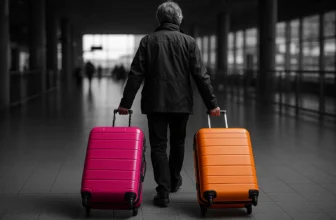
You know that sinking feeling when you book a flight, then see the same ticket for $200 less the next week? Yeah, I used to get that all the time.
But then I met Sarah, a flight attendant for American Airlines, at a coffee shop in Dallas. After a few drinks, she started sharing insider secrets that completely changed how I book international flights. And honestly? I wish someone had told me this stuff years ago.
Here’s the bottom line: Everything you think you know about booking international flights is probably wrong. That “book early, book on Tuesday” advice? Totally outdated. The new rules are wild, and they’re saving people serious money.
Let me break down what Sarah told me (and what the data proves) so you never overpay for a flight again.
Wait, Sunday is the New Tuesday?
Weekly Booking Patterns: The Sunday Advantage
Peak Booking Hours by Day
*Based on Expedia analysis of millions of international bookings
Remember when everyone said “book on Tuesdays for the best deals”? Forget that.
Sunday bookings now save you 17% compared to Monday and Friday bookings. That’s not chump change – that’s real money back in your pocket.
Here’s what happened: COVID completely flipped airline pricing on its head. People’s booking habits changed, and airlines had to adapt their algorithms. Now, Sunday has become the sweet spot because that’s when people sit down to plan their upcoming trips.
Think about it – you’re scrolling through Instagram on a lazy Sunday, see that dreamy photo of Santorini, and suddenly you’re checking flights. Airlines know this pattern, and they’ve priced accordingly.
Quick tip: If you’re looking at international flights, pull up that booking page on Sunday morning with your coffee. Your wallet will thank you later.
The “Book Early” Myth Just Got Destroyed
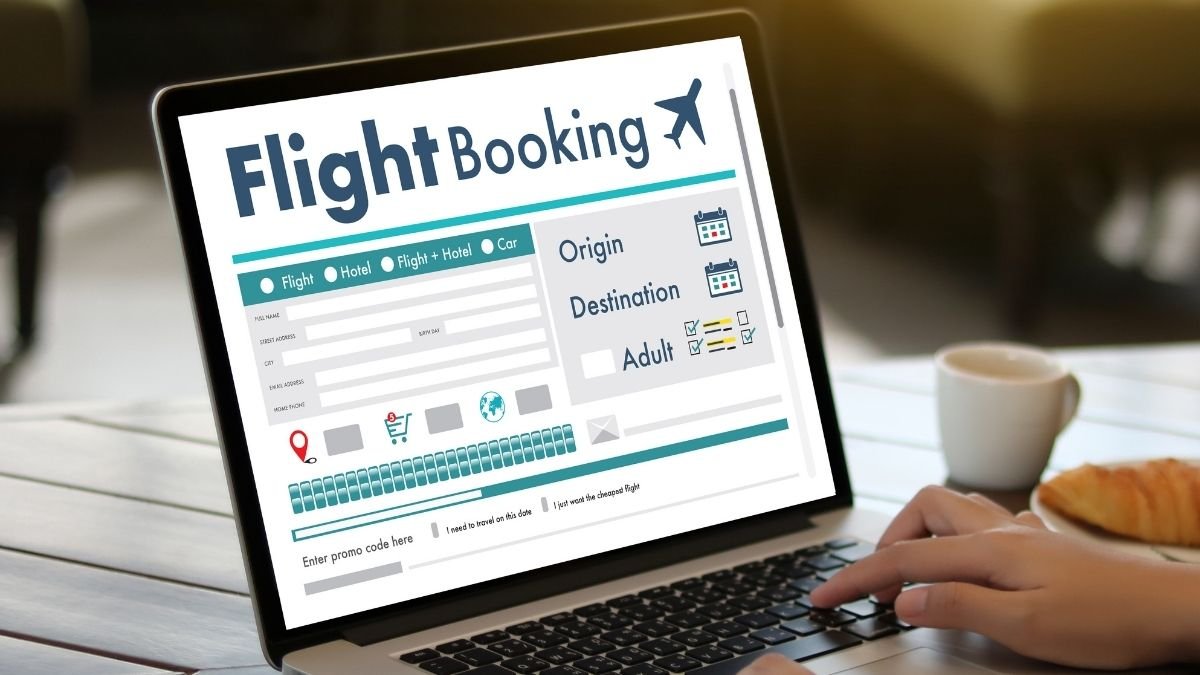
This one blew my mind.
You know how your parents always told you to book flights months in advance to get the best deals? Well, they meant well, but booking international flights just 18-29 days before departure now saves you up to 17% compared to booking 3+ months early.
Let that sink in.
The airlines’ fancy AI systems have completely flipped the game. They’ve realized that people who book super early are less price-sensitive (they’re just planning), so they can charge them more. Meanwhile, people booking closer to departure are often deal-hunters who’ll walk away if the price isn’t right.
Sarah explained it like this: “We see passengers all the time who booked their Rome trip six months ago, sitting next to someone who booked the same flight three weeks ago and paid $300 less. It happens every single flight.”
The sweet spot: 18-29 days for most international destinations. European trips? Aim for 3-6 months max. Asia and Oceania still benefit from earlier booking (5-7 months), but even that’s not the 6-12 months people used to recommend.
Your Travel Month Choice Could Save You $400

Want to know a secret that travel agents don’t want you to figure out?
August is secretly the cheapest month to fly internationally, despite being “peak season.” It sounds backwards, but the data doesn’t lie – you’ll save about 7% compared to March bookings.
Even better? September and October are travel’s best-kept secrets. We’re talking 30-32% savings compared to summer peaks. That’s an average of $400+ back in your pocket for a family of four.
Here’s why this works: Everyone thinks August is expensive, so fewer people book then. Meanwhile, September and October have amazing weather in most places, fewer crowds, and airlines are desperate to fill seats before the winter slump.
I learned this the hard way. Last year, I paid $1,200 for a July flight to Barcelona. My friend booked the same route in October for $750. Same airline, same class, same everything. The only difference? She was smart enough to avoid the “summer rush” mindset.
Pro tip: If you have any flexibility with your vacation dates, shifting your trip to early fall could fund your entire hotel stay.
The AI Revolution is Changing Everything (And You Can Use It)

Here’s where things get really interesting.
Airlines now use AI systems that are basically like ChatGPT, but for pricing. These systems update flight prices every 3 seconds based on millions of data points – everything from weather patterns in Singapore to how many people just searched for your exact route.
Lufthansa’s system can literally detect that business travelers from Singapore are 70% more likely to book premium seats when it’s raining locally. Then it adjusts prices in real-time.
Sounds scary, right? But here’s the thing – you can use this to your advantage.
The system works both ways. If demand drops suddenly (maybe there’s bad news about your destination, or another airline launches a sale), those AI systems will slash prices faster than a human ever could.
This is why booking apps like Hopper and Google Flights can predict price changes with 75% accuracy for the next week. They’re basically reverse-engineering the same AI systems airlines use.
Real People, Real Savings: The Numbers Don’t Lie
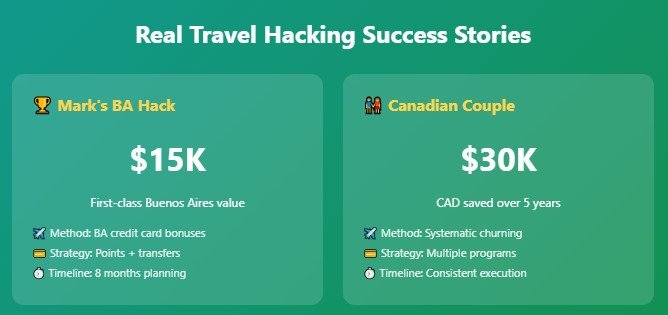
Let me tell you about Mark, a guy I met on a travel forum.
Mark figured out how to hack the system using credit card bonuses and strategic booking. He’s gotten $15,000 worth of first-class travel to Buenos Aires using British Airways credit card bonuses and smart point transfers.
Then there’s this Canadian couple who documented their entire strategy online. They’ve saved over $30,000 CAD in five years just by understanding airline programs better than most travel agents.
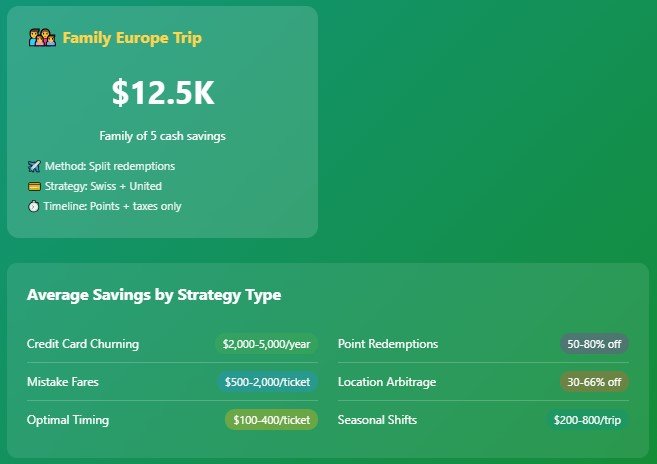
But you don’t need to be a travel hacking expert to save serious money.
Simple example: A family of five wanted to visit Europe. Instead of booking everything through one airline, they split their redemptions – Chicago to Zurich via Swiss, Rome to Chicago via United. Total cost? Just taxes and points instead of $12,500 in cash.
The key? They stopped thinking like regular consumers and started thinking like airlines think.
The Mistake Fare Goldmine (Shh, Don’t Tell Everyone)
Mistake Fares: The Ultimate Travel Hack Stats
Famous Mistake Fare Examples
Common Mistake Fare Causes
🚨 Speed Tip: Book first, ask questions later. Most mistake fares are honored within 24-48 hours
Want to know about the ultimate travel hack that airlines don’t advertise?
Mistake fares.
These are pricing errors that happen when airlines mess up their systems – and they happen way more often than you’d think. We’re talking about business class flights to Europe for under $300, or round-trip tickets to Asia for the price of a domestic flight.
Here’s the crazy part: Airlines honor these fares over 90% of the time, even when they’re obviously errors.
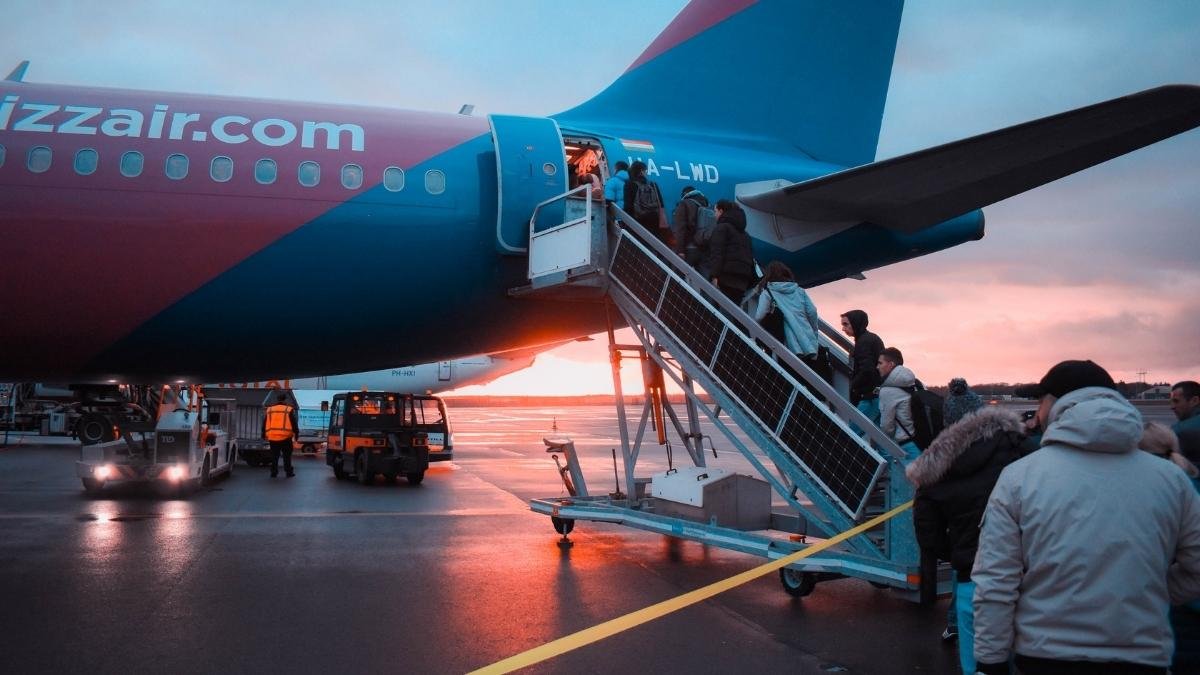
I once snagged a Chicago to Rome business class ticket for $249 round-trip. The normal price? Over $4,000. It was a currency conversion error in the airline’s system, and by the time they caught it, hundreds of people had already booked.
How to catch these: Follow Secret Flying, Scott’s Cheap Flights (now called Going), or set up Google Flights alerts for routes you’re interested in. When you see something that looks too good to be true, book first and ask questions later. You can always cancel if it doesn’t work out.
Post-COVID Changes You Need to Know
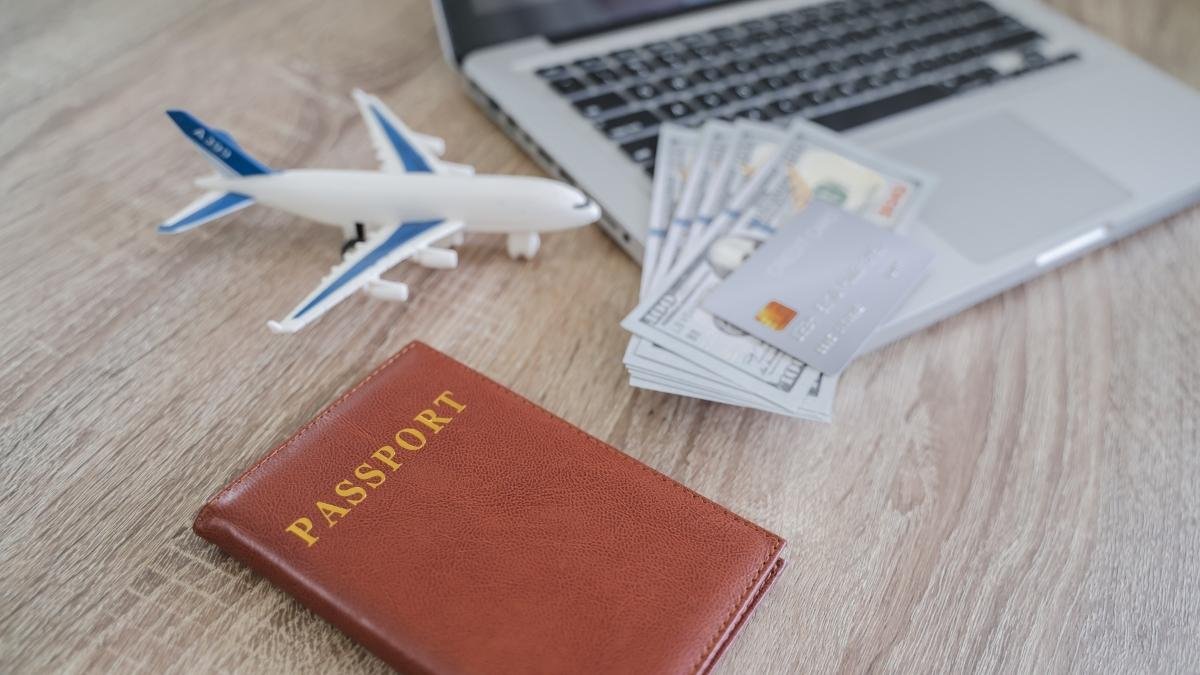
The pandemic didn’t just mess with our lives – it completely rewired how airlines price flights.
European flights are now 31% cheaper per kilometer than they were before COVID. Airlines are still trying to win back travelers, and that means deals for people who know where to look.
But here’s what most people missed: 28.4% of travelers now book closer to departure than they did before the pandemic. This creates opportunities if you’re flexible, but it also means less availability if you wait too long.

Sarah told me something interesting: “We’re seeing way more last-minute upgrades and special treatment for passengers who buy duty-free chocolates for the crew. It’s like everyone forgot how to travel nice, so when someone does something thoughtful, we remember them.”
The new reality: Airlines are more willing to negotiate and provide perks, but they’re also more unpredictable with pricing. Flexibility is your superpower.
What About All Those Booking Myths?

Let’s bust some myths that are costing you money:
“Airlines track your searches and raise prices.” Nope. That’s not how their systems work. The price changes you see are from other people booking seats or the airline’s AI adjusting for demand patterns.
“Incognito mode gets better deals.” This one makes me laugh. The price difference people think they see in incognito mode is usually just timing coincidence.
“Book exactly 54 days in advance.” These ultra-specific “rules” are marketing nonsense. Airlines don’t care what day of the year it is when setting prices.
“Clear your cookies.” Your cookies aren’t affecting flight prices. This myth probably started because someone checked prices at different times and saw normal price fluctuations.
The truth? Airlines use sophisticated revenue management systems, but they’re not personally targeting you. Understanding the real patterns (like Sunday booking and seasonal trends) matters way more than these weird tricks.
Your Action Plan: Start Saving Today
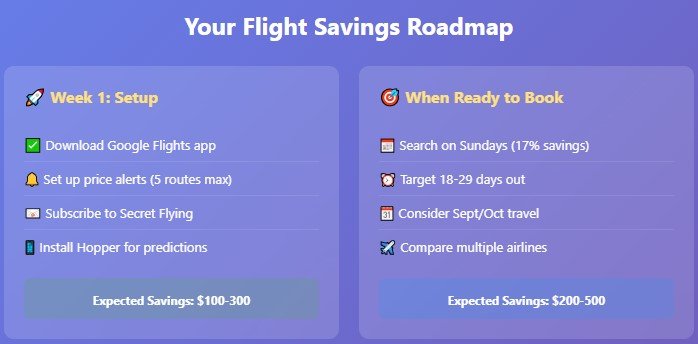
Alright, here’s your game plan for never overpaying for international flights again:
This week:
- Set up Google Flights alerts for routes you’re interested in
- Follow a mistake fare newsletter (Secret Flying is my favorite)
- Download apps like Hopper for price predictions
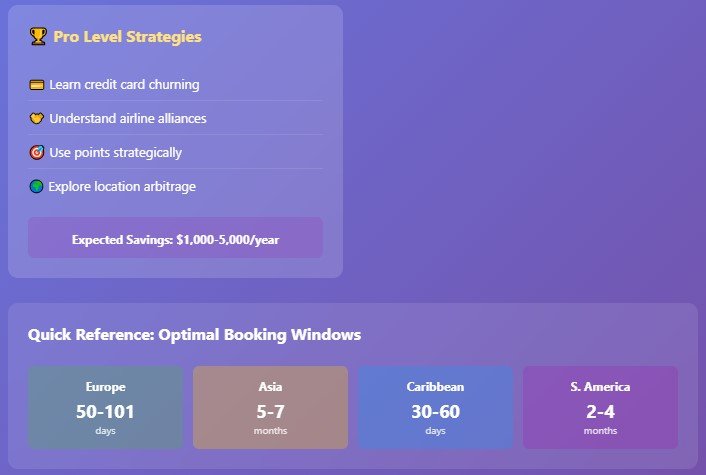
When you’re ready to book:
- Search on Sundays for the best prices
- Target that 18-29 day sweet spot for most international routes
- Consider September/October travel for maximum savings
- Be flexible with your dates – even a few days can save hundreds
Pro level:

- Learn basic credit card churning for free flights
- Understand airline alliance partnerships
- Use points strategically instead of cash when it makes sense
Don’t overthink it, though. The biggest savings come from understanding the major patterns, not obsessing over every little detail.
The Bottom Line
Look, I get it. All this information can feel overwhelming at first.
But here’s what Sarah told me that really stuck: “The passengers who save the most money aren’t necessarily the smartest ones. They’re just the ones who stopped following outdated advice and started paying attention to what actually works now.”
The airline industry changed dramatically in the last few years. The old rules don’t apply anymore. But if you understand the new rules – Sunday bookings, shorter advance windows, seasonal patterns, and how AI pricing really works – you can save hundreds or even thousands on every international trip.
Next time you’re planning a vacation, remember that “common wisdom” about flight booking might be costing you serious money.
Trust the data, not the myths. Your bank account (and your future vacation fund) will thank you.
Ready to start saving? Pull up Google Flights right now and start playing with some dates. Sunday morning, coffee in hand, looking at that dream destination you’ve been putting off because flights seemed too expensive.
You might be surprised at what you find.



